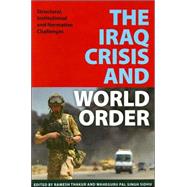
Note: Supplemental materials are not guaranteed with Rental or Used book purchases.
Purchase Benefits
Looking to rent a book? Rent The Iraq Crisis And World Order [ISBN: 9789280811285] for the semester, quarter, and short term or search our site for other textbooks by Thakur, Ramesh Chandra; Sidhu, Waheguru Pal Singh. Renting a textbook can save you up to 90% from the cost of buying.
| List of contributors | p. ix |
| Framing the issues | p. 1 |
| Iraq's challenge to world order | p. 3 |
| Lines in the sand: The United Nations in Iraq, 1980-2001 | p. 16 |
| Structural and normative challenges | p. 35 |
| The unipolar concert: Unipolarity and multilateralism in the age of globalization | p. 37 |
| International peace and security and state sovereignty: Contesting norms and norm entrepreneurs | p. 57 |
| The world says no: The global movement against war in Iraq | p. 75 |
| Perspectives from within the region | p. 93 |
| Iraq and world order: A Lebanese perspective | p. 95 |
| Iraq and world order: A Turkish perspective | p. 114 |
| Iran's assessment of the Iraq crisis and the post-9/11 international order | p. 134 |
| The Iraq crisis and world order: An Israeli perspective | p. 161 |
| Egypt and the Iraq war | p. 175 |
| Reactions in the Muslim world to the Iraq conflict | p. 187 |
| External actor perspectives | p. 201 |
| The United States and the United Nations in light of wars on terrorism and Iraq | p. 203 |
| Baghdad to Baghdad: The United Kingdom's odyssey | p. 217 |
| Explaining France's opposition to the war against Iraq | p. 234 |
| Iraq and world order: A Russian perspective | p. 249 |
| Iraq and world order: A German perspective | p. 265 |
| Avoiding a strategic failure in the aftermath of the Iraq war: Partnership in peacebuilding | p. 282 |
| Iraq and world order: A Latin American perspective | p. 298 |
| Iraq and world order: A Pakistani perspective | p. 315 |
| Iraq and world order: A perspective on NATO's relevance | p. 328 |
| The Iraq crisis and world order: A perspective from the European Union | p. 344 |
| Quicksand? The United Nations in Iraq, 2001-2005 | p. 357 |
| International legal and doctrinal issues | p. 379 |
| The war in Iraq as illegal and illegitimate | p. 381 |
| Legitimacy as an assessment of existing legal standards: The case of the 2003 Iraq war | p. 397 |
| The multinational action in Iraq and international law | p. 413 |
| Iraq and the social logic of international security | p. 426 |
| Justifying the Iraq war as a humanitarian intervention: The cure is worse than the disease | p. 444 |
| The responsibility to protect and the war on Saddam Hussein | p. 464 |
| Post-war relations between occupying powers and the United Nations | p. 479 |
| "Common enemies": The United States, Israel and the world crisis | p. 497 |
| Conclusion | p. 517 |
| Structural and normative challenges | p. 519 |
| Index | p. 535 |
| Table of Contents provided by Ingram. All Rights Reserved. |
The New copy of this book will include any supplemental materials advertised. Please check the title of the book to determine if it should include any access cards, study guides, lab manuals, CDs, etc.
The Used, Rental and eBook copies of this book are not guaranteed to include any supplemental materials. Typically, only the book itself is included. This is true even if the title states it includes any access cards, study guides, lab manuals, CDs, etc.